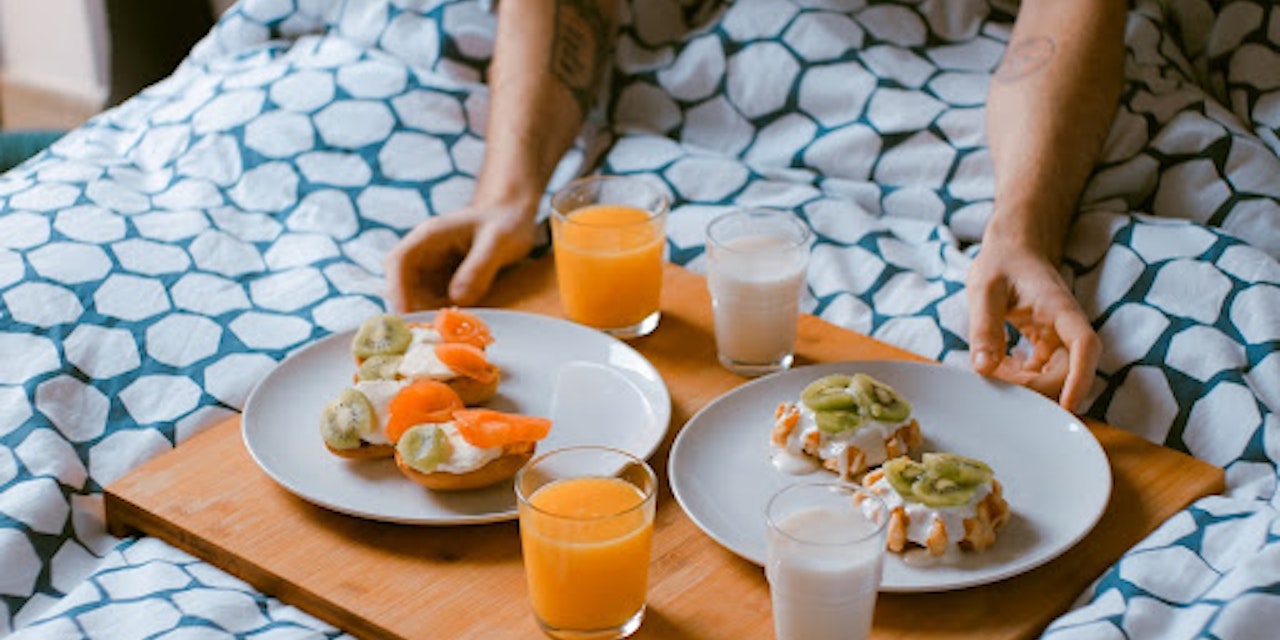What to eat for a better sleep
The relationship between sleep and nutrition is cyclical. Discover which foods to enjoy, and what to avoid, to get a great sleep tonight!
- Published: 3/2/2023
- 4 min. read

- Published: 3/2/2023
- 4 min. read
We’ve all been there. The day’s responsibilities come to an end so you plop on the couch and mindlessly snack. This is of course fine on occasion, but sometimes those not so healthy munchies can lead to late night tossing and turning.
The relationship between sleep and nutrition is cyclical. How we eat can influence the quality of our sleep while not getting enough rest can lead to less nutritious cravings. So let’s put it to rest and discover which foods to enjoy, and what to avoid, to get a great sleep tonight!
Foods that help you sleep
Although there’s no magic food that will immediately make you fall asleep, some nutrients can support your body in creating sleep hormones and regulating your circadian rhythm, or natural sleep-wake cycle.
Milk or dairy products
Ever heard of having a warm glass of milk before bed? Dairy products contain an amino acid, or protein building block, called tryptophan. This amino acid gets converted into the happy and calm brain chemical called serotonin. Some individuals have experienced that when consuming tryptophan before bedtime has been shown to help people fall asleep faster and reduce insomnia (1). Dairy foods are also rich in B vitamins which support the creation of serotonin.
Oatmeal isn’t only good for breakfast, it actually makes a great comforting pre-bedtime snack. Try this version with dairy to help you drift off: Apple Oatmeal.
Nuts and seeds
Nuts and seeds such as almonds, walnuts, and pumpkin seeds are rich in the minerals magnesium and zinc. Magnesium helps our muscles and mind relax. Studies have shown that a combination of magnesium and zinc can help reduce insomnia symptoms and promote a better sleep (2).
Nuts and seeds are healthy, but since they are high in fat, it's best to keep it to a handful before bedtime. Since too much fat can cause discomfort in the stomach. Or try this tasty smoothie recipe! It’s easily digestible and packed with tryptophan to ease you into a happy slumber: Banana & Walnut Shake.
Fatty fish
Fatty fish, such as sardines or salmon, contain vitamin D, which plays a role in serotonin and sleep regulation (3). It’s typically known as the sunshine vitamin, because our bodies naturally create it when we’re exposed to sunlight. Especially if we don’t get enough sunlight, such as during the winter months or if we’re indoors most of the day, it’s good to include vitamin D in your foods. Try this delicious fish recipe to up your vitamin D and guide you into dreamland: Lemon Salmon and Barley Salad.
Whole grains
Eating meals that are high-fiber and lower in fats have been suggested to lead to a deeper, more restful sleep (4). Whole-grains such brown rice, whole grain pasta, and whole grain bread can help increase serotonin without a drastic blood sugar peak and dip. Just make sure it's whole grain rather than refined or sugary foods because these are tied with a worse sleep.
For a quick and easy, yet nutritious and high protein bedtime snack, try Smashed Peas Toast with Burrata.
Foods or drinks that interfere with sleep
Some foods or drinks can interfere with sleep. Alcohol can interfere with the deep sleep cycles or cause middle of the night waking while caffeine can keep us awake. Try to limit or avoid both at least a few hours before bedtime.
When it comes to foods, focus on natural and whole versions of foods rather than processed foods such as cakes, chips, or fried foods. These can cause blood sugar spikes, making you feel energized or restless. Fatty foods take longer to digest, so can leave you feeling uncomfortable and uneasy.
When you eat makes a difference
Everyone is different but the timing of what you eat can impact how well you sleep. For most people, eating a big meal before bed can cause digestive issues such as heartburn or stomach ache. Eating too close to bedtime can also interfere with the circadian cycle because it may prevent melatonin, the sleep hormone from being produced.
Giving yourself a bit of time between your last meal and bed can also have a positive impact on your sleep hormones and digestive track. Eating a balanced natural meal two to three hours before bedtime, can help your body ease into rest. If you find yourself waking up at night because you’re hungry, listen to your body and consider adding healthy snacks such as one on Lifesum.
4 references (hide)
All of the content and media on Lifesum is created and published for information purposes only. It is not intended to be used as a substitute for medical advice or treatment. Users should always consult with a doctor or other health care professional for medical advice. If you have or think you are at risk of developing an eating disorder, do not use the Lifesum app and seek immediate medical help.